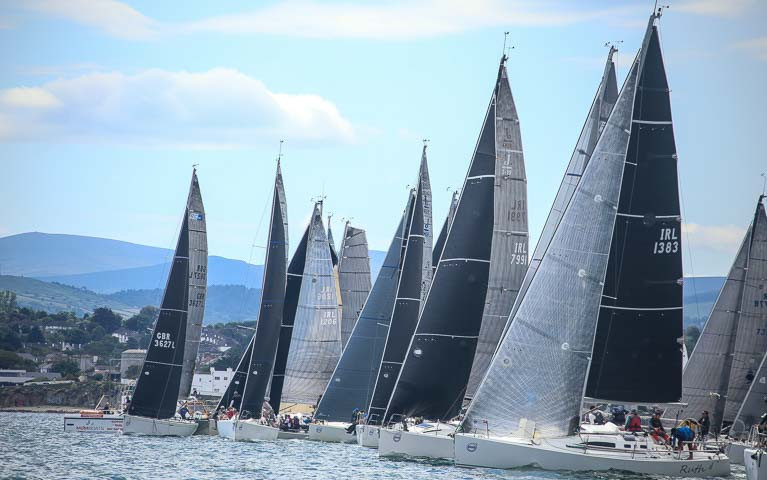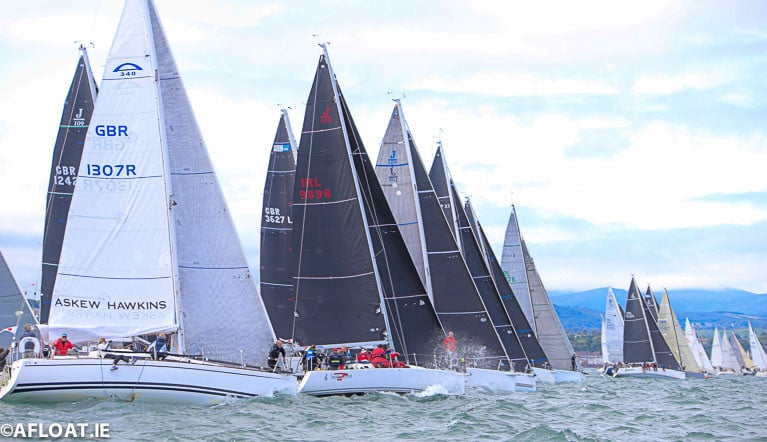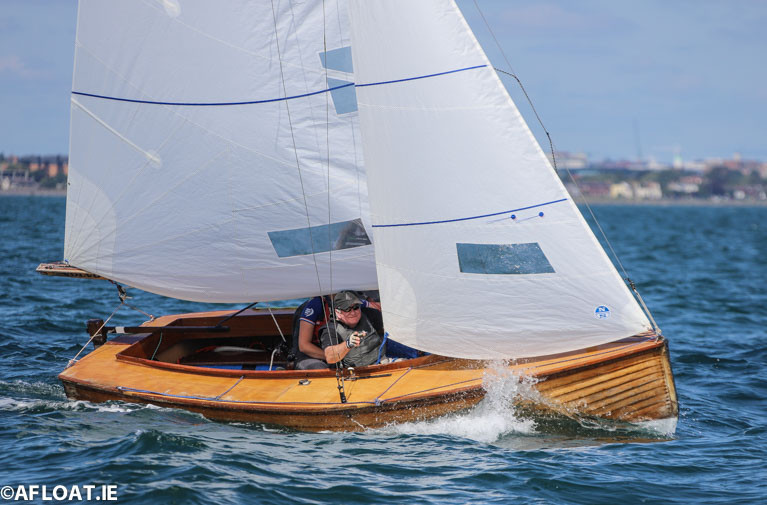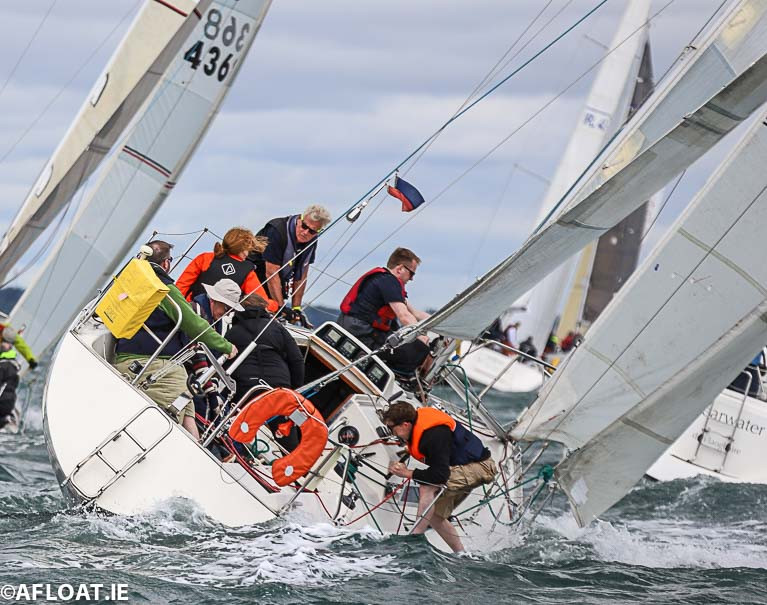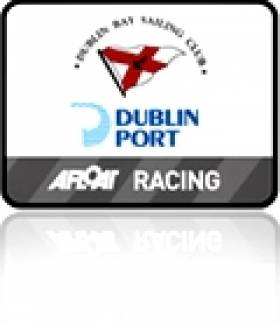Displaying items by tag: Dublin Bay Saiing Club
The Royal St. George Yacht Club Kirwan family won the Cruisers 4/5a Thursday evening AIB DBSC Summer Series race on Dublin Bay on July 21st.
Skippered by Paul Kirwan, the Beneteau 36.7, Boomerang beat Charles Broadhead's RIYC Sigma 38 Persistence.
In third place in the six-boat fleet was Johnnie Phillips Elan 333, Playtime from the National Yacht Club.
After 13 races sailed, Boomerang leads overall by seven points from Playtime.
A special presentation was made last night at the Royal St. George YC (Thursday, July 21) after Dublin Bay Sailing Club racing in memory of DBSC stalwart, the late Carmel Winklemann, with the presentation of a new perpetual trophy in her name for the top Corinthian boat in the National YC's Dun Laoghaire Dingle Race. More on that story here
Full results for all divisions are below.
After a successful lift in of yachts at Dun Laoghaire Harbour on April 9th the first Dublin Bay Sailing Club race for the 2022 summer season starts in ten days' time on Saturday, April 23rd.
Details of the extent of the changes have been recently published in DBSC's 2022 yearbook that is, as usual, packed with vital information for the Dublin Bay racing sailor.
DBSC provides racing for upwards of 300 yachts and dinghies on a 12-month basis drawn from all four Dun Laoghaire waterfront yacht clubs.
As regular Afloat readers will know, Dublin Bay Sailing Club (DBSC) unveiled some of its plans for the 2022 AIB DBSC racing programme in March here.
 DBSC provides nine race courses on four days a week
DBSC provides nine race courses on four days a week
The DBSC AIB race programme this year has been extended into September for mid-week racing and October for weekend racing. The new season will run from April 23 to October 1 and will include new Saturday courses.
Its 52-page publication available on the DBSC website (and below) is published in an online format and takes into account all the latest changes to the 2022 courses.
Writing in the yearbook, Club Commodore Ann Kirwan makes a special point of thanking 'the many talented people, on and off the water, who have devoted their energies to helping the club'.
Kirwan says 'Our aim is to provide top-quality racing over nine race courses on four days a week. We could not achieve this without our great committee, and a fantastic band of race management teams, race officers and patrol crew organisers'.
As reported yesterday on Afloat.ie, revised Sailing Instructions and Course Cards for all fleets have been issued by Dublin Bay Sailing Club (DBSC).
Documents are available from the DBSC website HERE, including the revised Notice of Race and cards pertaining to each individual class.
Club racers are reminded that boats sailed on Thursdays and Saturdays can now also sail on Tuesdays with the same format.
Tuesday racing is from Committee vessel(s) as the West Pier starter’s hut has not been installed, due to the difficulty of maintaining the current coronavirus safety rules.
A new Dublin Bay regatta involving the whole Dun Laoghaire sailing waterfront has been announced for July 31st to August 3rd.
The 'Dun Laoghaire Combined Clubs Solidarity Regatta 2020' is an initiative of all five of Dun Laoghaire's yacht clubs as a response to the COVID-19 interrupted season.
"The event is a joint effort of the DMYC, RIYC, RStGYC, NYC and DBSC", according to Mark McGibney, the sailing manager of the Royal Irish Yacht Club.
We plan to run this regatta from Friday 31st July to the 3rd August.
In these uncertain times, the clubs have also decided to 'book' the weekend of the 5th/6th September as reserve dates if the August dates fall through.
More details as we have them.
Read also: 2020 Irish Sailing Fixtures (The Beyond COVID-19 Version)
DBSC Squibs & Mermaids to Race Together in 2020 Summer Season
Dublin Bay Sailing Club's forthcoming 2020 summer season will feature Squibs and Mermaids will racing together on both Tuesdays (Dinghy Course), and Saturdays (Green Fleet course).
It's a change to existing arrangements as the club, announces its schedule for the season that begins on Saturday, April 25th.
As Afloat previously reported, Squibs and Mermaids will be scored as one class under PY handicap on Tuesdays and Saturdays, according to DBSC Hon Sec Chris Moore in DBSC amendment notice number 2.
First DBSC Races
Saturday 25th April: Tuesday: 28th April: Wednesday (Water Wags) 29th April: Thursday 30th April:
Last DBSC Races
Tuesday 25th August: Wednesday (Water Wags) 16th September. Thursday: 27th August: Saturday 26th September:
Weekly Racing
Tuesdays: Dinghies: PY, Squibs, Mermaids, IDRAs, Fireballs, Laser Std, Laser 4.7, Laser Radial
Wednesdays: Harbour racing: Water Wags
Thursdays: Committee Boats: All Classes Keelboats
Saturdays: West Pier Hut and two Committee Boats: All Classes Keelboats and Mermaids.
Saturdays: Harbour Fleet: Dinghies: PYs, IDRA, Lasers Standard, Radial, 4.7 and Fireballs.
47 Boat Fleet Ready for DBSC Spring Chicken First Race
A 47 boat fleet has been assembled for Sunday's first race of the Dublin Bay Sailing Club 'Spring Chicken' Series.
Four potent J109s will start as favourites in the handicap series along with a new Dublin Bay arrival 'La Response', a First 40, is also entered.
As Afloat previously reported, racing, sponsored by Citroen South, will be held on Sunday mornings at 10 am from February 2nd to March 8th.
Download handicaps and starts for Sunday's first race below.
DBSC Boats Asked Not to 'Crash' into Marine Data Buoy
#DUBLIN BAY – Dublin Bay Sailing Club (DBSC) Racing yachts have been asked by race organisers to give a marine data buoy stationed in Scotsman's Bay (Latitude: 53 17.51 N Longitude 006 07.00) a wide berth even though it may be on some DBSC race courses this season.
The buoy carries a lot of expensive research equipment and It's on the periphery of the Red fleet's Thursday courses and also the dinghy Tuesday evening courses.
A combined fleet of 300 boats race under the DBSC burgee on Tuesday, Thursday, Saturday and Sundays making the yachts the biggest leisure users of bay waters.
Competing boats might possibly meet the yellow buoy if on a port-hand tack when sailing a beat from 40 ft. mark to Bay Mark and vice versa.



























